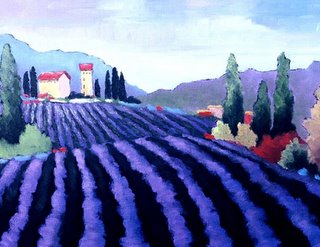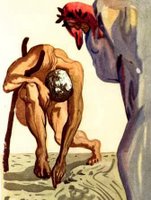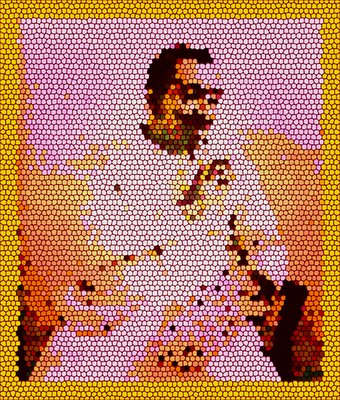Practicing all that I read I grasped what wasn't said
bringing down the jungle's lion as if a mere jackal it were!
applying right in practice all that I might profess
that's how I played & scored the goal of haal as it were
Siva abides in every every thing every where
how could one the Moslem from the Hindu separate?
if you've got a jot of wisdom of the Self you become aware
genuine knowledge of the Sahib this would demonstrate
One by one each action brings its consequence
it binds one even when laboring for others' good
if free in mind I offer all my works to God
the end is nothing but happiness in every world
The statue is stone the temple is stone
from pillar to post nothing but stone!
thoughtful Pandit! whom do you worship?
mind & breath must join into one
It's Siva or Keshava or Jina
it's Brahma the Lotus-born Lord
may he free me from the malady of the world! --
him or him or him or him!
Lalla she sought & searched for him!
beyond her limit of strength she strove
closed were the door! she longed all the more
fixing her gaze on his door with love
[vakh #47]:
Parun polum apuruy po'rum
Kesara vana volum rattith shaal,
Paras prounum ta paanas polum,
Ada gom moluum ta zinim haal.
[vakh #57]:
Shiv chuy thali thali rozaan
Mav zaan Hyound ta Mussalmaan
Trukhay chukh ta pananuy paan parzaan
Ada chay Saahibas zanni zaan
[vakh #49]:
yi yi karu'm kara pyatrum paanas
Arzun barzun beyyis kyut.
Antih laagi-roust pusharun swaatmas,
Ada yuuri gatsha ta tuury chum hyout.
[vakh #66]:
diiva vattaa divur vattaa
Peythha bvona chuy ikavaathh:
Puuz kas karakh huutt bhattaa,
Kar manas ta pavanas sangaatth.
[vakh #73]:
Shiv vaa Keshava vaa Zin vaa
Kamalajanaath naamadhaarin yuh,
Mey abali kaastan bhavaraoz,
Su vaa su vaa su vaa suh.
[vakh #74]:
Lal bo luutshu's tshaanddaan ta gaaraan
Hal mey kormas rasanishiti;
Vuchun hyotmas taari diientthmas baran
Meyti kal ganeyam zi zogmas tati.
scored the goal of haal: haal (Farsi) is the overall Sufi term for a state of spiritual exaltation.
It's Siva or Keshava or Jina: Keshava ("he with beautiful locks of hair") is among the names of Krishna. While Jina (the "Ascetic") is a term found in Jainism, this title is used by Lalla (and others of Hindu background in medieval India) as a respectful appellation for the Buddha.
knowledge of the Sahib: is there playfulness here, that Lalla, a devotee of Siva, refers to him as "the Sahib"? (the Master: an honorific originating in Arabic). It reminds of how Kabir (uniquely) referred to God as Raam Rahim (the Merciful Raam -- where Rahim is an Arabic/Islamic name/attribute of Allah, and Raam [Ramachandra] is as Hindu as anyone can possibly get). Too (thinking of language in comparative mysticism), one recalls the address of God by Spanish (Catholic) poets as "Señor" -- which feels reminiscent of Lalla's "Sahib." When the British came to India in later centuries, the word Sahib was re-purposed as a form of address fairly specific to this new ruling class of gentlemen. In modern Hindi, an expression like bhai-saheb (lit., "brother-Mister") now seems ubiquitous. But then, we have the Khan-Sahibs [maybe "Lordly Mister"] -- always Moslem -- of Hindustani music . . . Who (other than, as here, God) would normally be addressed as "Sahib" in Lalla's era, remains (for me) a slight question, in short. I'm (very vaguely) guessing it to have perhaps been a sort of feudal title(??) Might it be applicable to landed gentry? Such extended threads of question pull out of the 2 syllables . . . and then get thinned into mist.This is the fifth installment of new versions I've been rendering from the Kashmiri poet Lalleshwari. (See earlier recent posts for a bit more background.)
Perhaps this would be a good point to summarize the vakhs (verses) from Lalla blogged so far:
1. "
Even the shadows" = 3 vakhs
2. "
A fool carpenter" = 7 vakhs
3. "
& how!" = 2 vakhs
4. "
Dead already" = 10 vakhs
5 "
Knowledge of the Sahib" = 6 vakhs [the present installment],
for a total of 28 verses transcreated & blogged. (There thus remain 110 verses extant & attributed to Lalla, not yet perused here, according to
this scholarship (which, as already noted, comprises the source I've been working from -- looking 95% at the English, and 5% at the transliteration! [approximately; i.e., I'm illiterate in Kashmiri (& Hindustani), but know a few stray words here & there]. I'm only attempting verses that I seem able to get a handle on. To try to tackle the whole body of her poetry, I would need either to study the language, or at least to collaborate with a literate Kashmiri reader/scholar. Such steps are presently beyond scope of this blog -- but if anyone knowledgeable of Kashmiri should care to collaborate, I'd be much obliged.)














































